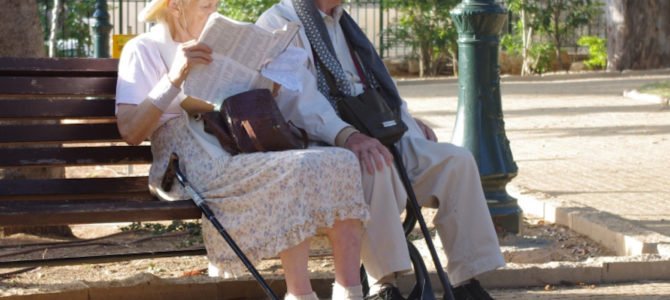
My cousin called the other day and sounded very stressed. Come to think of it, who doesn’t feel a bit stressed these days? Her source of stress was her parents, who are in their 70s. She complained they would not take this Wuhan coronavirus outbreak seriously.
What she really meant was that they are not making the same choices about it that she is. Neither of her parents wear the masks she sent them when they are out and about, they didn’t stock up on hand sanitizer or toilet paper, her dad still planned to attend his weekly Toastmasters meeting, and her mom was getting ready to see her friends from the wine club this week. They were both bummed when their gatherings got canceled.
My cousin was beside herself. She couldn’t understand why in the world her parents wouldn’t take the coronavirus threat seriously, or why they still planned to carry out their normal routines, even given the abundance of medical data demonstrating that the elderly are the most vulnerable group in this pandemic.
My cousin is not the only one frustrated with her aging parents. I have heard many similar complaints from others. In fact, there is a growing number of advice columns aiming to arm millennials and Gen Xers with more data, information, and strategies for how to convince their aging parents to take the pandemic seriously. But what if our parents are taking the coronavirus seriously, just in their own way, rather than by freaking out like we are?
We live in a culture obsessed with looking and acting young. Take mainstream media, for example. Unless one can maintain a youthful, radiant image, one ceases to be relevant. This obsession is further worsened by social media, which demands we constantly engage in connecting, sharing, and posting images.
We must constantly generate witty or remarkable comments so we can gain followers, be “liked,” maintain an “ideal” ratio, and feel important, loved, or admired. We are glued to our smartphones, some of the most powerful technological devices ever invented. Who needs to ask an elder for advice when we have the ability, via our phones, to search for any information and share it with the rest of the world instantly? The ability of our phones makes us feel we are experts in many things.
How I Learned to See My Parents Differently
Our parents’ generation didn’t grow up with all these gadgets. Most of them are either not on social media or their presence is minimal. Many struggle with using technology the younger generation takes for granted.
My parents are in their 70s, and they still use their iPhone as a landline. They leave it at home when they go out and only use it when they need to call someone. They barely have any pictures saved on their phone because they don’t know how to find them.
Of course, they have never heard of Instagram and are always puzzled by our uncontrollable need to snap pictures of everything just to share them with strangers. I must have taught my parents how to use FaceTime a dozen times. So far, they have only learned how to receive my video calls, but they haven’t yet learned how to FaceTime me back.
I used to have very little patience in teaching my parents to operate new technology. In a sense, their struggle made it easy for me to feel I was smarter and better than they were.
After experiencing an unfortunate life-changing event, however, I realized I was neither smarter nor better. My parents foresaw what might happen and warned me about it, and I dismissed their concerns. I thought that because I had access to information they didn’t have, I was better. I thought they were too old-fashioned and their suggestions were too outdated. Turns out, I was the fool. Had I listened to them, my life would have turned out very differently.
Now I see my parents in a different light. Their grey hair is an accumulation and reflection of life experiences and years of wisdom. Their wrinkles are a sign of strength because they have not only survived but also triumphed over many of life’s ups and downs, as well as unimaginable sufferings and losses.
There Is a Time for Everything
Technology can change how we live, but it cannot change life itself. No matter how much the world around us evolves, the circle of life goes on the same way no matter what technology we have. As the Bible notes:
There is a time for everything,
and a season for every activity under the heavens:
a time to be born and a time to die,
a time to plant and a time to uproot,
a time to kill and a time to heal,
a time to tear down and a time to build,
a time to weep and a time to laugh,
a time to mourn and a time to dance,
a time to scatter stones and a time to gather them,
a time to embrace and a time to refrain from embracing,
a time to search and a time to give up,
a time to keep and a time to throw away,
a time to tear and a time to mend,
a time to be silent and a time to speak,
a time to love and a time to hate,
a time for war and a time for peace.
The elders in our lives, including my parents, have been through all these different times. They have walked down paths that we have yet to set foot on. They know where the potholes are. They know what to expect, what’s important, and what’s trivial.
Non-Panicked Parents Inspire Us to Be Better in Hardships
I asked my parents if they are worried about the pandemic, and they told me they had been through much worse in their lives: famine, armed conflicts, and helplessly watching their loved ones perish. They are not freaking out about the coronavirus like we are because they have seen it all.
They told me this pandemic shall pass, just like the numerous other challenges they have faced in their lifetime. They said that, yes, we should follow all the good personal hygiene practices and some preventative measures, but still, we must try to live a normal life as much as possible. That’s why they did not stock up on hand sanitizer. Soap and water are perfectly fine, they said.
I asked them what helped them survive their hardships and keep strong. They said it was their shared love for each other, their strong sense of responsibility toward people who count on them, including aging parents and younger siblings, and since they became Christians, their unwavering faith that God is in control.
My parents shared one of their favorite Bible verses with me, Philippians 4:6-7: “Do not be anxious about anything, but in every situation, by prayer and petition, with thanksgiving, present your requests to God. And the peace of God, which transcends all understanding, will guard your hearts and your minds in Christ Jesus.”
One thing I learned so far from the Wuhan virus outbreak is that constantly reading anything and everything related to the pandemic is not healthy. Clare Foges, a columnist for the London Times, compared our obsession for all coronavirus-related news and social media posts to “glugging saltwater to release ourselves of thirst: initially comforting, ultimately counterproductive.”
She went on to say, “Social media is now a repository of fears, conspiracy theories, doomsday scenarios — and our neurological kit cannot cope too well with all this bad news.” She recommends we all take a quarantine from social media for at least 24 hours. I couldn’t agree more.
While we step away from social media, let’s get closer — not physically during the pandemic, of course, but emotionally — to our parents and elders in our community. We can offer to help them pick up groceries and prescriptions, and they can teach us how to stay calm and remain hopeful for the future. When the pandemic eventually passes, we will all become better and stronger together.









